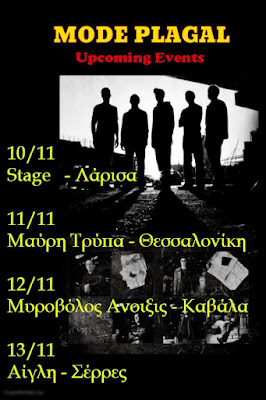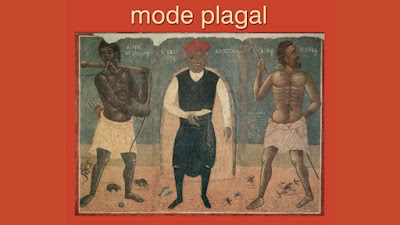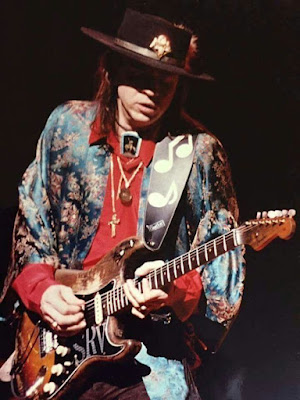Something very strange has been happening at the butt of the Balkans for the past decade. Greek music, which in the days of the dictators endured campaigns to cleanse it of oriental influence, has been reaching east for the echoes of its Levantine soul.
Mode Plagal are typical of the Byzantine ability to look both ways at once. On first hearing, they are a driving, straightahead jazz-funk outfit. Listen longer and the restless Greek spirit, audible in the
transcendent sax of Thodoris Rellos, becomes evident, drawing from rembetika - the Greek blues - and the dance music of the Balkans, Thrace, Asia Minor and all points east. Mode Plagal have also crossed the line to produce a remarkable album, influenced by classical Byzantine/Ottoman music, with the Turkish group Bosphorus, led by the Zambian-born composer Nikiforos Metaxas - a solitary Greek salmon who has swum against the tide of history and returned to Constantinople.
Mode Plagal, an inspired, pioneering Greek jazz-folk fusion group, is unique in Greece and beyond, for its ability to cover over-familiar (and thus, potentially boring) material in a way that sounds fresh and new, carrying the Greek vernacular into the 21st century better than almost anyone else in the country today.
They have been going strong for twenty-five years as friends and fifteen years as a group, releasing their first album (Mode Plagal I) on AnoKato Records in 1995, before moving to Lyra Records where they released their next two albums (I and II) and then their collaboration with the Istanbul-based ensemble Bosphorus titled Beyond the Bosphorus on Hitch-Hyke Records. Apart from their own
considerable success both within and beyond Greece, the three primaries in the ensemble, Thodoris Rellos, Takis Kanellos and Kleon Antoniou, are also sought-after session musicians and can be found behind recent successes by Alkinoos Ioannidis, Eleni Tsaligopoulou, Yiota Vei and Vassilis Skoulas; on recent projects by Greece's homegrown Dylan, Dionysis Savvopoulos; and in projects such as 667 and 'mandata sound.' Their session work results in the emergence of new ideas but also brings out the negative side, like the tension associated with playing in front of large audiences, day in and day out, performing material other than your own.
One late September day in 2005, in Thessaloniki, Mode Plagal's drummer and founding member, Takis Kanellos, talked about the past, the present and the future of Mode Plagal, touching on many of the subjects that are crucial for understanding the inner working of this unique ensemble: how they first
encountered the Greek tradition, their relation to jazz, their belief and faith in the power of music, their future plans and dream collaborations, their desire to bring out the relevance of the vernacular music for today's audiences, the deconstruction of the technical details behind their success, their views on their success abroad and their future plans. It is a story with unfamiliar angles, based on coincidences and centered around friendship, inquisitiveness, quality and the joy of life.
When the three founding members of Mode Plagal first came together in 1980, they came from different backgrounds but had similar objectives. Antoniou was into rembetika, which was with him from infancy - his parents used to listen to traditional music from Epirus and rembetika and he was known to sing that kind of music in feasts and parties. Rellos was into Byzantine music and influenced
by relatives like his uncle, a cantor in the Greek church. Kanellos was playing rock, blues and jazz. All three, however, liked jazz and its power of improvisation. They liked the spirit it gave them to produce music "without the need of an overwhelming virtuosity," as he self-effacingly put it. He says it was not a conscious effort to do something complicated or analytical, but rather to make music that would flow and be danceable, whether it was in a dance-alienating 17/8 or not. Their influences were multiple, but they focused on the great popular musical styles of Britain and America: rock, blues and jazz, and later New Wave, funk, soul and hip-hop.
They also were influenced by groups and singers from Greece and abroad - Led Zeppelin, Socrates
(Drunk the Conium), Bourboulia, Poll, Area, and later Police and famous Greek jazz players Sakis Papadimitriou and Floros Floridis. Kanellos believes that the way Papadimitriou would hammer his piano or Floridis would play in a completely atonal mode opened their eyes to the freedom of jazz.
MODE PLAGAL - MODE PLAGAL II 1998
Label: Lyra
Released: 1998
TRACKS
01. Funky Vergina [0:05:48.00]
Traditional tune originating from Western Macedonia. Arranged by Mode Plagal.
02. Miles' Leventikos [0:07:00.73]
(gallant song) Mimis Doutsoulis - Thodoris Rellos NB.
transliterated Greek title: "To Leventiko tou Miles"
03. The Letter [0:09:31.26]
Sender: Asemina Rellou Thodoris Rellos (voice: Th. Rellos) NB. transliterated Greek title: "To Gramma"
04. Carols [0:06:10.69]
(Traditional Christmas carols originating from Thrace) Arranged by Mode Plagal NB. transliterated Greek title: "Kalanta"
05. Ulysses [0:01:25.97]
(Improvisation) Mode Plagal NB. transliterated Greek title: "Odysseas"
06. Kalamatianos [0:04:31.80]
(Folk Dance) Arranged by Mode Plagal. In Memoriam of Charlie Parker
07. Pikrodafni [0:06:36.42]
(...a Blues) - (traditional song originating from Epirus) Arranged by Mode Plagal. Vocals: Kl. Antoniou, Th. Rellos, Ant. Maratos, T. Kanellos and Maria Aristopoulou, Sophia Papazoglou, Vassilis Hadjinikolaou, Panayotis (Chico) Katsikiotis, whom we thank for kindly accepting to participate in this album.
08. Helios [0:03:52.20]
(Traditional tune originating from Continental Greece) Arranged by Mode Plagal. In memoriam of Vassilis Soukas
09. Cyclops [0:00:18.90]
(Improvisation) Mode Plagal NB. transliterated Greek title: "Kyklopas"
10. Rock Around Eleven [0:03:44.46]
Thodoris Rellos
11. Ivo [0:05:05.80]
(Traditional tune originating from Bulgaria) Arranged by Mode Plagal
12. Solo Sax [0:02:27.40]
Live recording from Half Note Club, Athens
13. Salona [0:04:15.60]
(Traditional tune originating from Continental Greece) Arranged by Mode Plagal
14. Solo Drums [0:01:06.13]
(17/17)
15. On Foreign Lands [0:04:42.16]
(Traditional tune originating from Thrace) Arranged by Mode Plagal NB. transliterated Greek title: " 'Gw sta ksena "
16. Blazing Sun [0:01:44.33]
Mode Plagal NB. transliterated Greek title: "Ntala Helios"
MEMBERS
Thodoris Rellos - alto saxophone
Cleon Antoniou - electric guitar
Antonis Maratos - electric bass
Takis Kanellos - drums
Angelos Polychroniou (in tracks 1,2,3,4,10,11,15) congas - (in track 7) Tambourine
MP3 @ 320 Size: 160 MB
Flac Size: 456 MB
MODE PLAGAL - MODE PLAGAL III 2001
Released: 2001
"In Greek Mode … one of the more inventive bands in the current Greek roots scene…" is how Chris Williams introduces Mode Plagal in his April 2002 feature in fRoots magazine (UK). "... compared to the king of the Thraecian wedding music, the Bulgarian clarinet player Ivo Papasov,..[...]..Mode Plagal are more radical in dissolving the ethnic references..." writes T. Maas, about their 2001 live appearance in Club Paradiso, Amsterdam (The Netherlands).
"… Mode Plagal is hipper than any American record I've heard in a long time… they make a case for fusion that might have saved the genre twenty years ago…" is how Modern Drummer (USA) magazine responded to ethnic-jazz combo Mode Plagal's self-titled debute release back in 1995.
Mode Plagal belong to a group of bands who, using the jazz technique, have created a unique musical idiom. An idiom with references to traditional music and verse, to Byzantine sounds, funk rhythms and many other musical elements which do not belong to just one genre, or have not been used per se, but only as influences.
The Athens based band was formed in 1990 by Thodoris Rellos (saxophone, voice), Kleon Antoniou (guitars, voice) and Takis Kanellos (drums).
In 1995 Antonis Maratos (bass) joins the band and they release their first album, MODE PLAGAL, on Ano Kato records, Thessaloniki.
In 1998, with the addition of Angelos Polychronou (percussion), they release MODE PLAGAL II on Lyra.
This second album was voted No 96 in the annual WMCE (World Music Charts Europe) Top 100, for the year 2000.
In 2001, with the addition of Manos Saridakis and Florian Mikuta -who joins the band in their live concerts ever since- (keys), they release their 3d album, MODE PLAGAL III, on Lyra. Unlike its predecessors, whose material was mostly instrumental, Mode Plagal III features a formidable cast of
some of the country's finest female vocalists, Yiota Vei, Savina Yannatou, Eleni Tsaligopoulou and Theodosia Tsatsou.
Mode Plagal III pays also tribute to the richness and beauty of traditional greek verse, the aesthetics that define the demotic tradition and the personification in folk poetry of birds and animals, to who the anonymous creator lends human attributes.
MODE PLAGAL III was voted No 13 in the Top 20 of the WMCE (World Music Charts Europe) in March 2002, and No 33 in the TOP 100 for the Year 2002. With the recording of their third album, Mode Plagal have completed 12 years of dealing, researching and experimenting on traditional greek
music. In 2003, in cooperation with the traditional group Bosphorus from Turkey, artistic direction by Nikiforos Metaxas, they release with Hitch Hyke the album "Beyond the Bosphorus", with new compositions by artists of both groups, and with the voice and lyrics of Vassiliki Papageorgiou. Tracks of Mode Plagal albums are included in international world music releases (World Music Network (UK) - Rough Guide to Greece, 2001, fRoots compilation (UK)- summer 2002, Resistencia (Spain)- "Grecia, Oriente y de Occidente" and more)
Mode Plagal have collaborated on stage with many artists, recently with Eleni Tsaligopoulou (1999-2000), with Bosphorus group (2001-2), Yiota Vei and Vasilis Skoulas (2001), Dionysis Savvopoulos (2002-3). They have also recorded for the National Greek Radio (the legendary 3rd program), and for the New National Television (NET).
The group, a dynamic live band, has given numerous concerts all over Greece and has appeared in many festivals in Greece and abroad, to name a few: 2nd CYCLADIC JAZZ FESTIVAL, the 5th EURO-SYRIAN JAZZ festival (1999, DAMASCUS), the Athens "MEGARON" Concert Hall (1999), 1st and 2nd ETHNIC-JAZZ festival in Athens (2000-1), NATIONAL PERCUSSION FESTIVAL
(Thessaloniki), in Smyrni and Istanbul (TURKEY) in collaboration with Bosphorus, for the 100 years of George Seferis, 2000), GAIA festival (Thessaloniki 2001), the BARBICAN THEATRE (London, 2001), in DEN HAAG, AMSTERDAM, UTRECHT and ROTTERDAM (in collaboration with Anadolu Feneri group, a branch of Bosphorus), EARTHFESTIVAL in SPAIN (2001), in Club PARADISO, AMSTERDAM (2001), NIGMEJEN, UTRECHT, DE WARANTE (2001), BATH FRINGE FESTIVAL (2003), QUEEN ELIZABETH – London (2003) and many more.
MODE PLAGAL have managed, up to the highest point, to function and create as a group of autonomus musical nature. Blending jazz, funk, greek folk, byzantine, balcan, african rhythms and
more, and balancing with mastery these elements, combing them with their spontaneity and humor - basic element in their work - they manage to show that tradition is alive and always developing and to create their distinct recognizable sound, a musical idiom of their own, fresh, well-crafted and finally downright radical.
Mode Plagal III
Unlike its predecessors, whose material was mostly instrumental, "Mode Plagal III" features a
formidable cast of some of the country's finest female vocalists, Yiota Vei, Savina Yannatou, Eleni Tsaligopoulou and Theodosia Tsatsou.With the recording of their third album, Mode Plagal have completed 10 years of dealing, researching and experimenting on traditional greek music. In "Mode Plagal III",the group arranges traditional greek folk songs from Continental Greece, Epirus, Thrace, Macedonia and the Aegean island of Patmos.
TRACKS
01. Mode Plagal - A NIGHT IN KARPENISIA (Instrumental)
02. Θοδωρής Ρέλλος - Εμένα μου το 'παν τα πουλιά = ONCE, THE BIRDS CONFESSED TO ME - Thodoris Rellos
03. Γιώτα Βέη - Ντελή Παπάς (Παπα-Γιώργης) = DELI PAPAS (Papa-Yiorgis) - Yiota Vei
04. Mode Plagal - Λερικός (Γκάιντα) = LERIKOS (Gaida - Bagpipe) - Cleon Antoniou (Dedicated To The Memory Of Jimi Hendrix)
05. Σαβίνα Γιαννάτου - Κάλαντα Θράκης = THRACIAN CHRISTMAS CAROLS - Savina Yannatou
06. PERISTEROUDA (Bossa 7/8) - Cleon Antoniou
07. Γιώτα Βέη - Στου μαυριάνου τ' αλώνι = ON MAVRIANOS' THRESHING YARD - Yiota Vei
08. Θεοδοσία Τσάτσου - Τα παιδιά της γειτονιάς σου = LADS ACROSS YOUR NEIGHBOURHOOD - Theodosia Tsatsou
09. Mode Plagal - (Τρια παιδιά βολιώτικα) = TROIS ENFANTS DE VOLIOTIQUE (Instrumental)
10. Ελένη Τσαλιγοπούλου - Μαύρα Χελιδόνια = BLACK SWALLOWS - Eleni Tsaligopoulou
11. Mode Plagal - Λήμνος = LEMNOS (Instrumental)
12. Mode Plagal - Φεγγαράκι = LITTLE MOON - Thodoris Rellos, Cleon Antoniou
13. Ορχήστρα - Δημητρώ = DEMETRO (Instrumental)
MEMBERS
Thodoris Rellos - Alto & Baritone Saxophone, Lead Vocals
Cleon Antoniou - Electric Guitar, Lead Vocals & Percussion (11)
Manos Saridakis - Fender Rhodes & Hammond
Antonis Maratos - Electric Bass, Percussion (4,5,6,7,11) & Backing Vocals
Takis kanellos - Drums, Percussion (1,6,7,11) & Backing Vocals
Angelos Polychoniou - Percussion (Conga, Timbales, Djembe)
MP3 @ 320 Size: 168 MB
Flac Size: 495 MB
































































